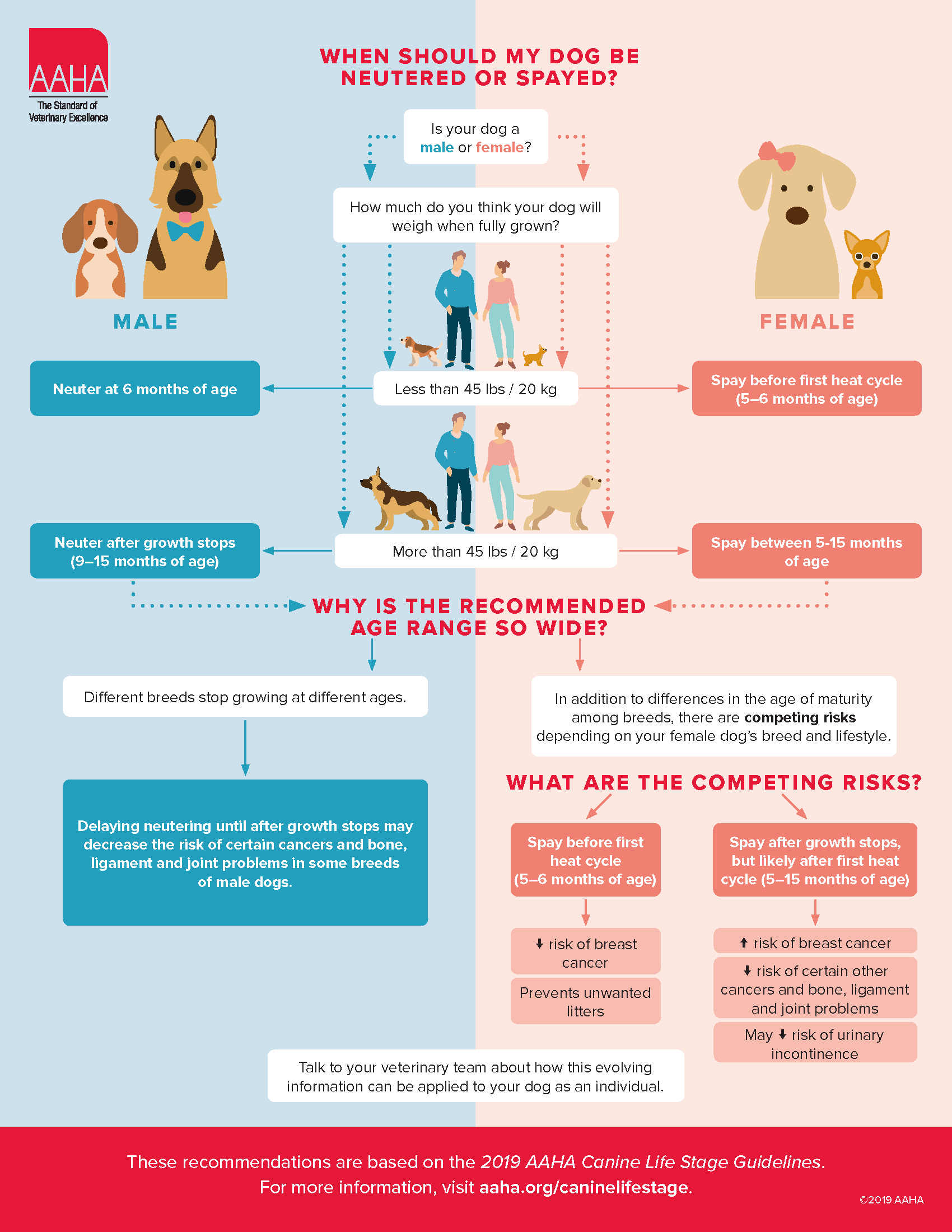No, a dog is never too old to be neutered. Neutering can be done at any age, but there are factors to consider for older dogs.
Neutering offers several health benefits, even for senior dogs. It can prevent certain cancers and reduce the risk of infections. However, older dogs may face more surgical risks compared to younger ones. Consulting with your vet is crucial. They can assess your dog’s health and determine if neutering is safe.
We’ll explore the benefits and risks of neutering an older dog. We’ll also provide tips to ensure a smooth procedure and recovery. Understanding these factors can help you make the best decision for your furry friend.
Benefits Of Neutering
Neutering your dog is a decision that comes with a range of benefits, not just for your beloved pet but for you as well. If you’re wondering whether your dog might be too old for this procedure, it’s important to weigh the advantages. Let’s dive into some of the key benefits of neutering your furry friend.
Health Improvements
One of the primary reasons to consider neutering your dog, regardless of age, is the potential for significant health improvements. Neutering can reduce the risk of certain cancers and other serious health issues.
- Reduced Risk of Cancer: Neutering can lower the risk of testicular cancer and prostate issues in males. In females, it reduces the chance of ovarian and uterine cancers.
- Prevention of Infections: Spaying (neutering a female dog) can prevent uterine infections, which can be life-threatening and require costly treatments.
These health benefits can lead to a longer, happier life for your pet. And who wouldn’t want more time with their loyal companion?
Behavioral Changes
Behavior is another area where neutering can have a positive impact. Many dog owners notice a marked improvement in their pet’s behavior post-neutering.
- Less Aggression: Neutered dogs are often less aggressive, which can make them easier to manage and more pleasant to be around.
- Reduced Roaming: Intact dogs, especially males, have a strong drive to roam in search of a mate. Neutering reduces this urge, which helps keep your dog safe and close to home.
- Decreased Marking: Neutering can also decrease urine marking, which is a common issue with intact males.
These changes can make your dog more sociable and easier to train. Plus, a well-behaved dog is less likely to get into trouble or cause issues with neighbors.
In conclusion, while age is a factor to consider, the benefits of neutering your dog extend well into their senior years. Always consult with your vet to determine the best course of action for your furry friend. After all, their health and happiness are worth the effort.

Credit: thundermountainline.com
Risks Of Neutering Older Dogs
Neutering older dogs can come with certain risks. As dogs age, their bodies change. These changes can affect how they respond to surgery. Understanding these risks helps you make the best decision for your pet.
Surgical Complications
Older dogs may face more surgical complications. Their organs might not work as well as before. This can increase the risk during surgery. The heart and liver are often a concern. These organs play a big role in handling anesthesia. Older dogs may have underlying health issues. Vets need to run tests to check for these conditions. Surgery on older dogs requires extra care and attention.
Recovery Time
Recovery time for older dogs can be longer. Younger dogs heal faster after surgery. Older dogs’ bodies take more time to bounce back. They may need more rest and care. Pain management is also crucial. Older dogs might feel more pain after surgery. This can affect their recovery. Keeping them comfortable is important. Follow the vet’s advice closely. This helps ensure a smooth recovery process.
Health Conditions To Consider
Neutering an older dog can be a delicate decision. Health conditions play a crucial role in determining if it’s the right choice. Understanding these conditions can help you make an informed decision.
Existing Medical Issues
Older dogs might have underlying health problems. Conditions like heart disease, diabetes, or liver issues can complicate surgery. It’s essential to discuss these with your vet. They can assess if your dog can handle anesthesia and surgery.
Joint problems are also common in older dogs. Arthritis or hip dysplasia can make recovery harder. Your vet might suggest additional treatments to manage these conditions before surgery.
Breed-specific Concerns
Some breeds are more prone to certain health issues. For instance, large breeds like German Shepherds may have more joint problems. Smaller breeds might face different challenges.
Breeds with brachycephalic (short-nosed) features, like Bulldogs, can have respiratory issues. These can complicate anesthesia. Your vet will consider these breed-specific concerns before making a recommendation.
Consulting With A Veterinarian
Consulting with a veterinarian is crucial before deciding to neuter an older dog. The vet will assess your dog’s overall health. This helps to ensure the surgery will be safe. Every dog is different. An expert opinion is necessary to make the best decision for your pet.
Pre-surgery Assessment
Before the surgery, the vet will conduct a thorough pre-surgery assessment. This includes a physical exam and blood tests. The vet checks for any underlying health issues. Older dogs may have conditions that need special attention. The vet’s goal is to ensure your dog can handle the surgery.
The pre-surgery assessment helps in planning the procedure. It also helps in managing any risks. If the vet finds any health concerns, they will address them first. This step is vital for the safety of your dog.
Post-surgery Care
Post-surgery care is also very important. Your dog will need time to recover. The vet will give you specific instructions. Follow these to help your dog heal properly. Keep the surgical site clean and dry. Watch for any signs of infection. If you notice anything unusual, contact your vet.
Make sure your dog rests and avoids strenuous activities. Provide a comfortable, quiet space for recovery. Proper post-surgery care ensures your dog returns to normal quickly. Your vet is your best resource during this time.
Age-related Factors
Age-related factors play a significant role in determining if a dog is too old to be neutered. Understanding these factors helps pet owners make informed decisions about their dog’s health and well-being.
Life Expectancy
Dogs have different life expectancies based on their breed and size. Smaller breeds tend to live longer than larger ones. For example, a Chihuahua might live up to 15 years, while a Great Dane might only live 8 years. Knowing your dog’s life expectancy is important. It helps gauge the potential benefits of neutering at an older age.
Quality Of Life
Neutering can affect a dog’s quality of life. Older dogs might face more risks during surgery. However, neutering can prevent certain health issues. This includes prostate problems and some cancers. Weighing these factors is crucial. Consulting with a vet can provide clarity. They can assess the dog’s overall health.
Some older dogs might have existing health issues. These issues can complicate surgery. It’s essential to consider these risks. Ensuring a dog’s comfort and health should be a priority. The decision should always be in the dog’s best interest.

Credit: www.amcny.org
Alternative Options
Neutering older dogs may come with risks. Luckily, there are alternative options. These can be less stressful for senior pets. Owners can explore non-surgical methods and behavioral training. These methods can help manage or reduce unwanted behaviors.
Non-surgical Methods
Non-surgical methods include hormone therapy. These treatments can reduce testosterone in male dogs. This can help control aggression and marking. Hormone therapy is less invasive and can be a good option for older dogs.
Another method is the use of chemical castration. This involves injections that reduce fertility. It’s temporary and can be reversed. This method can help if surgery is too risky.
Behavioral Training
Behavioral training can also be effective. It focuses on modifying your dog’s behavior. Training can help reduce aggression, marking, and roaming.
Positive reinforcement techniques can be very helpful. Reward your dog for calm behavior. This can encourage better habits without the need for surgery.
Consistency is key in behavioral training. Regular sessions can lead to long-term changes. This option can be safer for older dogs.
Success Stories
It’s easy to wonder if your old dog is too old to be neutered. But don’t worry, many pet owners have faced the same question. Let’s dive into some heartwarming success stories that prove age is just a number when it comes to neutering dogs.
Case Studies
Consider the case of Buddy, a 10-year-old Labrador Retriever. His owner, Susan, was concerned about his advanced age and the potential risks associated with surgery. After consulting with her veterinarian, she decided to proceed with the neutering. The operation went smoothly, and Buddy recovered quickly. He even seemed more energetic and happier in the following months.
Then there’s Max, a 12-year-old Beagle with a history of health issues. His owner, John, was hesitant but ultimately chose to neuter Max after learning about the health benefits, such as a reduced risk of prostate problems. Max’s recovery was uneventful, and he enjoyed a higher quality of life post-surgery.
Veterinarian Testimonials
Veterinarians also have valuable insights to share. Dr. Emily Carter from Happy Paws Veterinary Clinic notes, “I have seen many senior dogs do very well after being neutered. While each case is unique, age alone should not be a deterrent.”
Dr. Mark Thompson, a vet with over 20 years of experience, emphasizes, “With modern anesthesia and surgical techniques, the risks associated with neutering older dogs are minimal. We take extra precautions to ensure the safety and well-being of senior pets.”
These testimonials highlight that with proper care and veterinary guidance, neutering older dogs can lead to positive outcomes.

Credit: www.reddit.com
Making An Informed Decision
Age alone doesn’t determine if a dog is too old to neuter. Veterinary evaluation helps decide the best choice. Neutering can still offer health benefits for older dogs.
Deciding to neuter an older dog is not always easy. It’s important to gather all necessary information. Understanding the pros and cons can help you make the best choice for your pet.Weighing Pros And Cons
Neutering can prevent certain health issues. It may reduce the risk of prostate problems and tumors. On the other hand, surgery in older dogs has higher risks. Anesthesia can be more dangerous for them. Recovery time might be longer. Discuss these factors with your vet to see what’s best for your dog.Long-term Considerations
Think about your dog’s future health. Neutering might extend their life by preventing diseases. It can also reduce unwanted behaviors, making them easier to manage. But consider the immediate risks of surgery. Older dogs may need more care post-operation. Weigh the benefits against the potential risks. Always consult your vet for personalized advice. “`Frequently Asked Questions
What Age Is It Too Late To Neuter A Dog?
There is no specific age limit to neuter a dog. Consult your vet for the best timing based on health.
Is It Safe To Neuter A 7 Year Old Dog?
Yes, it is generally safe to neuter a 7-year-old dog. Consult your vet for a thorough health check first.
What Happens If You Wait Too Long To Neuter Your Dog?
Waiting too long to neuter your dog can increase health risks like cancer and behavioral issues. Early neutering is advisable.
Is It Worth Neutering An Older Dog?
Yes, neutering an older dog can be beneficial. It can improve health, reduce cancer risks, and decrease aggressive behavior. Always consult your vet for personalized advice.
Conclusion
Neutering older dogs can be safe with proper care. Always consult your vet first. Every dog is different, so individual assessment is crucial. Benefits often outweigh risks, even in older dogs. Neutering can improve health and behavior. Consider your dog’s overall health before deciding.
Keep your furry friend happy and healthy.